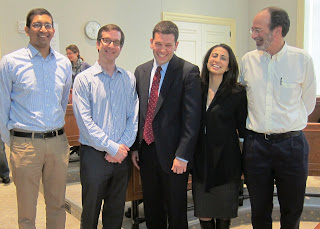I've written before about a
ssisted suicide as a
repugnant transaction. Some of the history of the debate in the United States is captured in the life of Dr. Jack Kevorkian, sometimes nicknamed "Dr.Death," who died on Friday.
Dr. Jack Kevorkian Dies at 83; A Doctor Who Helped End Lives
"Dr. Jack Kevorkian, the medical pathologist who willfully helped dozens of terminally ill people end their lives, becoming the central figure in a national drama surrounding assisted suicide, died on Friday in Royal Oak., Mich. He was 83."
...
"In arguing for the right of the terminally ill to choose how they die, Dr. Kevorkian challenged social taboos about disease and dying while defying prosecutors and the courts. He spent eight years in prison after being convicted of second-degree murder in the death of the last of about 130 ailing patients whose lives he had helped end, beginning in 1990."
...
"His critics were as impassioned as his supporters, but all generally agreed that his stubborn and often intemperate advocacy of assisted suicide helped spur the growth of hospice care in the United States and made many doctors more sympathetic to those in severe pain and more willing to prescribe medication to relieve it.
"In Oregon, where a schoolteacher had become Dr. Kevorkian’s first assisted suicide patient, state lawmakers in 1997 approved a statute making it legal for doctors to prescribe lethal medications to help terminally ill patients end their lives. In 2006 the United States Supreme Court upheld a lower court ruling that found that Oregon’s Death With Dignity Act protected assisted suicide as a legitimate medical practice."
...
"In 1984, prompted by the growing number of executions in the United States, Dr. Kevorkian revisited his idea of giving death row inmates a choice. He was invited to brief members of the California Legislature on a bill that would enable prisoners to donate their organs and die by anesthesia instead of poison gas or the electric chair.
"The experience was a turning point. Energized by the attention of lawmakers and the news media, he became involved in the growing national debate on dying with dignity. In 1987 he visited the Netherlands, where he studied techniques that allowed Dutch physicians to assist in the suicides of terminally ill patients without interference from the legal authorities.
"A year later, he returned to Michigan and began advertising in Detroit-area newspapers for a new medical practice in what he called “bioethics and obiatry,” which would offer patients and their families “death counseling.” He made reporters aware of his intentions, explaining that he did not charge for his services and bore all the expenses of euthanasia himself.
...
"He also talked about the “doctrine” he had developed to achieve two goals: ensuring the patient’s comfort and protecting himself against criminal conviction. He required patients to express clearly a wish to die. Family physicians and mental health professionals were consulted. Patients were given at least a month to consider their decision and possibly change their minds. Dr. Kevorkian videotaped interviews with patients, their families and their friends, and he videotaped the suicides, which he called medicides.
"By his account, he assisted in some 130 suicides over the next eight years. Patients from across the country traveled to the Detroit region to seek his help. Sometimes the procedure was done in homes, cars and campgrounds.
"Prosecutors, jurists, the State Legislature, the Michigan health authorities and Gov. John Engler seemed helpless to stop him, though they spent years trying. In 1991 a state judge, Alice Gilbert, issued a permanent injunction barring Dr. Kevorkian from using his suicide machine. The same year, the state suspended his license to practice medicine. In 1993, Michigan approved a statute outlawing assisted suicide. The statute was declared unlawful by a state judge and the state Court of Appeals, but in 1994 the Michigan Supreme Court ruled that assisting in a suicide, while not specifically prohibited by statute, was a common-law felony and that there was no protected right to suicide assistance under the state Constitution.
"From May 1994 to June 1997, Dr. Kevorkian stood trial four times in the deaths of six patients. With the help of his young and flamboyant defense lawyer, Mr. Fieger, three of those trials ended in acquittals, and the fourth was declared a mistrial.
"Mr. Fieger based his winning defense on the compassion and mercy that he said Dr. Kevorkian had shown his patients. Prosecutors felt differently. “He’s basically thumbed his nose at law enforcement, in part because he feels he has public support,” Richard Thompson, the prosecutor in Oakland County, Mich., told Time magazine in 1993.
"But on March 26, 1999, after a trial that lasted less than two days, a Michigan jury found Dr. Kevorkian guilty of second-degree murder. That trial came six months after Dr. Kevorkian had videotaped himself injecting Thomas Youk, a patient suffering from amyotrophic lateral sclerosis (Lou Gehrig’s disease), with the lethal drugs that caused Mr. Youk’s death on Sept. 17, 1998."
*********
Subsequent stories make clear that Dr. Kevorkian was a difficult ally of the 'death with dignity' movement that has mobilized e.g. for the Oregon laws on assisted suicide:
A Polarizing Figure in End-of-Life Debates







